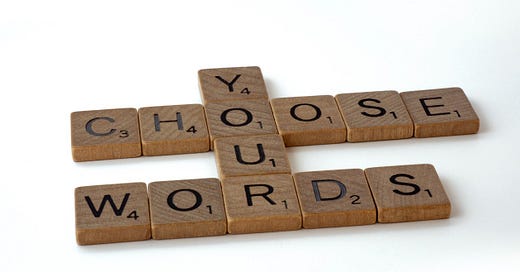Phrases that you might not realize are ableist
Calling out ableist language is the first step to rehabilitating a disability non-inclusive environment.
Photo by Brett Jordan on Unsplash
Ableism is a set of beliefs or practices that devalue and discriminate against people with physical, intellectual, or psychiatric disabilities and often rests on the assumption that disabled people need to be “fixed” and are not equal to non-disabled individuals. The accepted and everyday use of ableist language is *one* piece of evidence that an environment may consider disability discrimination acceptable.
Recently, my employer established an inclusive language module in Microsoft Word, where documents can be reviewed for non-inclusive languages. Because of the advocacy of the disability employee resource group, ableist language was added as one of the things highlighted and more inclusive language was suggested.
ADHD / OCD / Bipolar / Schizophrenic (when not referring to the actual mental health conditions)
Use: Describes stereotypical traits of a medical condition in a person who doesn’t have the condition.
Issue: Generally used as an insult.
Substitute: Distractable, preoccupied, repetitive behavior
All-hands
Use: Usually refers to a business meeting where everyone is invited to attend. Derives from the phrase “all hands on deck,” referring to shipping.
Issue: Not everyone has hands.
Substitute: All-staff
Bound
Use: Conveys that the user is restricted to a particular thing such as a chair, bed, or house.
Issue: Implies lack of control over one’s surroundings.
Substitute: uses a wheelchair, stays at home, stays in bed.
Crazy, Idiot, Moron, Insane
Use: All imply mental health or intellectual or developmental delays.
Issue: Uses a medical term to describe behavior unrelated to a disability.
Substitute: absurd, bizarre, foolish
Differently Abled / Special Needs
Use: Generally used by well-meaning people without disabilities. Frequently used in American K-12 education settings.
Issue: This term is for the comfort of the non-disabled speaker to avoid using the word disability because of the negativity THEY perceive in that term.
Substitute: Disabled or the term preferred by the individual
Disabled (when used to refer to software or website components)
Use: Buttons are frequently described as “disabled” when they can’t be used.
Issue: Implies that being disabled is equivalent to being broken.
Substitute: Inactive
Handicapped
Use: Someone with a disability.
Issue: This phrase may derive from “cap in hand,” implying that people with disabilities are frequently beggars.
Substitute: Disabled, accessible (when referring to parking spaces or restrooms). When directly communicating with someone, ask them what term they use to describe themselves and adopt that. In particular, determine if the individual prefers people-first language or identity-first language.
Invalid
Use: Invalid is a homonym. It can mean either incorrect or a person with a chronic illness.
Issue: Because of the dual use of the word, the definitions overlap.
Substitute: Chronic illness
Lame
Use: something that is silly. Derives from the term used for animals that can’t walk.
Issue: Lame animals on a farm are ones that can’t be used for their original purpose. Furthermore, lame animals are sometimes euthanized. Implies a negative.
Substitute: uncool, silly, incongruous
Low or High functioning
Use: Frequently used to describe autistic people or people with developmental delays.
Issue: Creates an ableist hierarchy where one form of a disability (high functioning) is preferred.
Substitute: Nothing. Don’t label or categorize disabilities outside of the medical setting, ever.
Retarded
Use: pertaining to low intelligence.
Issue: comes from the French word retard, meaning slow. Focuses on the negatives of the disability.
Substitute: If you need to describe someone with an intellectual or developmental delay, use that phrase or its abbreviation IDD.
Spaz
Use: Short for “spastic,” a medical term that means spontaneous muscle contraction. Frequently used referring to cerebral palsy.
Issue: Meant to be an insult to someone without a disability.
Substitute: uncoordinated, someone with poor balance or poor spatial awareness.
Suffer, Victim, Battle, Overcome (when referring to a medical condition)
Use: Frequently used in the news to drum up sympathy for the person being discussed.
Issue: Paints a negative picture of the person with a disability, who may not perceive themselves as either suffering or being a victim. Also implies that the person is at war with their disability.
Substitute: Use people-first language, such as a person with cancer or a person who experienced an acid attack.
DEI language moves quickly, and disability language possibly moves the quickest of all DEI language, probably because it is one of the newer entrants into most workplace DEI efforts. Initially, the disability community focused on getting rid of just a couple of the most blatantly offensive terms. Now, we have moved into a new round of
what words/phrases imply that disability is negative, and;
what implies abilities that not everyone has.
Before the situation happens (and you know it will), practice how you will respond to hearing one of these phrases. My stock response is:
“You know, the disability community considers X an ableist term, and we/they prefer you use Y instead.”




I don't understand Disabled (when used to refer to software or website components). There is nothing wrong or broken about a disabled button on a website, it just can't or doesn't do something. It's like your heading for "differently abled" -- it's fine to refer to disabled things as disabled because they are, and there's nothing wrong with that.